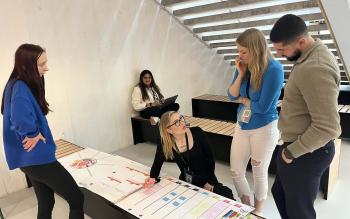
Wellbeing column: Winning the lottery doesn’t bring happiness
You get used to the things you get. Therefore, it’s not worth asking yourself what you want to achieve, but how you want to live your life. Study Psychologist Anna Takkunen writes about this in her column.

Body
When I was studying for the psychology entrance exams, I had only one goal in my mind: to get into university. I imagined the moment when I would receive the news of acceptance, and it felt like I wouldn't want anything else in life – then I would be happy. When I finally received the news of acceptance, I was truly happy – for a moment. Soon enough, new goals emerged – to pass the course, find an internship, graduate, get a job.
The idea that achieving a certain goal would bring happiness is a common misconception: "If only I get that job. If only I could take that trip. If only I got a pay raise. Then I would be happy!" Studies show that, for example, happiness returns to the same level within a year after winning the lottery.
This is related to a tricky characteristic of the human mind: adaptation. When you get something new, whether it's a degree place, a piece of clothing, or a pay rise, you quickly get used to it, and it no longer evokes the same feelings of excitement as when you first obtained it. After achieving a goal, there is always a new goal. Therefore, achieving a goal does not bring lasting happiness.
Another challenge related to goals is that achieving them is not always solely in our hands. You might really want a particular job and be an excellent candidate, but someone else might still get the job. That's why it's not wise to build your happiness solely on achieving goals.
Instead of asking yourself what you want to achieve, ask why and how. Why do you want to study in your field? Why is your hobby important to you? How do you want to act as a friend? How do you want to treat yourself? How do you want to live your life? Identifying these important values helps you live life on your own terms and brings meaning to everyday life. Recognizing what is important to you helps focus on those things that you can influence yourself. They are like compass directions that you can always follow.
Once the direction is clear, goals can be helpful. What could you spend fifteen minutes on this week that is important to you? What small action will take you towards the direction you want to go?
P.S. Do you want to learn more about what makes people happy? I highly recommend the free and open online course The Science of Well-Being by Yale University






